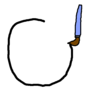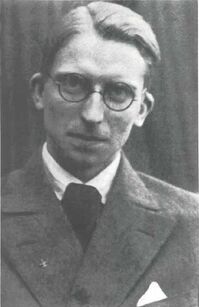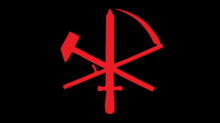| Line 109: | Line 109: | ||
==Further Information== | ==Further Information== | ||
===References=== | |||
<references/> | |||
===Articles=== | ===Articles=== | ||
*[[w:Karl_Otto_Paetel|Karl Otto Patel]] | *[[w:Karl_Otto_Paetel|Karl Otto Patel]] | ||
Revision as of 21:57, 21 November 2023
 |
Work in Progress "I'll be done any day now!" - Still-Being-Drawnism This page is not done yet and may still contain inaccurate information or miss important details. |
“Is clearly visible, hoisting the banner of Eternal Germany that was rolled up by their fathers and forming the columns of German Nationalist Communism in the camp of the revolution.”
Paetelism is the forefather ideology to ![]() National Bolshevism and all variants of it. This Ideology differentiates from
National Bolshevism and all variants of it. This Ideology differentiates from ![]() modern National Bolshevism as it's less esoteric and more strictly about Cultural Rightism with
modern National Bolshevism as it's less esoteric and more strictly about Cultural Rightism with ![]() Leftist economics, due to his lack of satisfaction with the KPD.
Leftist economics, due to his lack of satisfaction with the KPD.
Beliefs
![]() Paetelism is based on the thoughts of German political figure Karl Otto Paetel. Paetel sought to combine ordinary
Paetelism is based on the thoughts of German political figure Karl Otto Paetel. Paetel sought to combine ordinary ![]() Marxist thought with
Marxist thought with ![]() Ultranationalism. He, unlike the meme version, hated
Ultranationalism. He, unlike the meme version, hated ![]() Fascism and
Fascism and ![]() Nazism due to their
Nazism due to their ![]() Anti-Marxism and, according to him, non-German nature. Also unlike the modern, stereotypical NazBol, he was opposed to the
Anti-Marxism and, according to him, non-German nature. Also unlike the modern, stereotypical NazBol, he was opposed to the ![]() Strasser brothers, specifically Otto, accusing him of not understanding Marxism and being insufficiently socialist.
Strasser brothers, specifically Otto, accusing him of not understanding Marxism and being insufficiently socialist. ![]() Christianity was also something that he despised as he saw it as a philosophy which was alien to German society.
Christianity was also something that he despised as he saw it as a philosophy which was alien to German society.
Personality
![]() Paetelism is less prone to memes and is more serious compared to his
Paetelism is less prone to memes and is more serious compared to his ![]() National Bolshevism. Despite being called a "fascist" by progressives like
National Bolshevism. Despite being called a "fascist" by progressives like ![]() Anarcho-Communism and
Anarcho-Communism and ![]() Marxism-Leninism, he is still very much anti-nazi.
Marxism-Leninism, he is still very much anti-nazi.
Karl Otto Paetel Biography
![]() Karl Otto Paetel (23 November 1906 – 4 May 1975) was a German political journalist. During the 1920s, he was a prominent exponent of National Bolshevism. During the 1930s, he became a member of anti-Nazi German resistance.
Karl Otto Paetel (23 November 1906 – 4 May 1975) was a German political journalist. During the 1920s, he was a prominent exponent of National Bolshevism. During the 1930s, he became a member of anti-Nazi German resistance.

Paetel was born on 23 November 1906 in Berlin.[1] He attended the Siemens-Oberrealschule where he got involved in the Köngener Bund youth group.[1] He later studied at the Friedrich-Wilhelm University of Berlin.[1]
Paetel was involved in the German Youth Movement and became a prominent leader in the Deutsche Freischar that formed part of it.[1] He belonged to its ![]() "national revolutionary" tendency, which sought to marry elements of both the radical left and the radical right in order to form a Third Position between the Nazi Party and the Communist Party of Germany. To this end he established his own Arbeitsring Junge Front and subsequently the Group of Social-Revolutionary Nationalists to promulgate his syncretic views.[2] The latter group was established in 1930 due to his disillusionment with the
"national revolutionary" tendency, which sought to marry elements of both the radical left and the radical right in order to form a Third Position between the Nazi Party and the Communist Party of Germany. To this end he established his own Arbeitsring Junge Front and subsequently the Group of Social-Revolutionary Nationalists to promulgate his syncretic views.[2] The latter group was established in 1930 due to his disillusionment with the ![]() Nazi Party, a group he had hitherto been well disposed towards, as he felt that their revolutionary rhetoric was insincere and that their essential nature was conservative.[3] Nonetheless, he felt that the Nazi Party still contained "useful" revolutionary elements and was particularly active in attempting to win over members of the Hitler Youth to his side.[4] In 1930 he became co-editor of Die Kommenden with prominent nationalist
Nazi Party, a group he had hitherto been well disposed towards, as he felt that their revolutionary rhetoric was insincere and that their essential nature was conservative.[3] Nonetheless, he felt that the Nazi Party still contained "useful" revolutionary elements and was particularly active in attempting to win over members of the Hitler Youth to his side.[4] In 1930 he became co-editor of Die Kommenden with prominent nationalist ![]() Ernst Jünger.[1]
Ernst Jünger.[1]
After escaping from internment by the French police in May 1940, he fled via southern France to Spain, and then to New York. There, he resumed his journalistic activities and worked as a correspondent. In 1943, he married his fiancée Elisabeth Zerner. After the war, he edited the magazine Deutsche Gegenwart and wrote about Jünger. In 1975, he died in Forest Hills, Queens, in New York City.[5]
How to Draw
Normal

- Draw a very dark, but not completely black circle
- Draw Group of Social Revolutionary Nationalists design in the middle in red
- Add the glasses
And you're done!
| Color Name | HEX | RGB | |
|---|---|---|---|
| Black | #000000 | 0, 0, 0 | |
| Red | #EC1C24 | 236, 28, 36 | |
Relationships
Friends
 Marxism - My father! He showed me that our nation is exploited by capitalists!
Marxism - My father! He showed me that our nation is exploited by capitalists! Ethnonationalism - My mother! The only true variant of nationalism!
Ethnonationalism - My mother! The only true variant of nationalism! Ethnopluralism - Every race should have their own nation and stay there.
Ethnopluralism - Every race should have their own nation and stay there. Council Communism - The best form of government.
Council Communism - The best form of government. Norse Pagan Theocracy - The true religion of Germany!
Norse Pagan Theocracy - The true religion of Germany! Irredentism - We must reclaim Germanys lost terretories!
Irredentism - We must reclaim Germanys lost terretories! Pan Germanism - We must create greater germany!
Pan Germanism - We must create greater germany!
Frenemies
 Marxism-Leninism - Good system but too internationalist. I'm really disapointed by the KPD
Marxism-Leninism - Good system but too internationalist. I'm really disapointed by the KPD National Bolshevism - My son who stole my name! But why do you love him so much?
National Bolshevism - My son who stole my name! But why do you love him so much? National Communism - Very close but drop this internationalism thing
National Communism - Very close but drop this internationalism thing
Enemies
 Capitalism - You exploit my nation!
Capitalism - You exploit my nation! Globalism - How the capitalists destroy our nation
Globalism - How the capitalists destroy our nation Fascism - You are just a variant of capitalism
Fascism - You are just a variant of capitalism National Socialism - The anti-marxist traitor! You are not a National Socialist, you are a capitalist!
National Socialism - The anti-marxist traitor! You are not a National Socialist, you are a capitalist! Esoteric Fascism - You may worship the true gods but you still se4ve the guy above
Esoteric Fascism - You may worship the true gods but you still se4ve the guy above Christian Theocracy - You are an invader from the Middle East! You destroyed the true religion of Germany!
Christian Theocracy - You are an invader from the Middle East! You destroyed the true religion of Germany! Strasserism - You aren't a true National socialist and I know that you will betray the national revolution. Also why do you love Christian invaders so much?
Strasserism - You aren't a true National socialist and I know that you will betray the national revolution. Also why do you love Christian invaders so much? Fourth Theory - An eurasian empire controlled by Russia is not in the interest of Germany
Fourth Theory - An eurasian empire controlled by Russia is not in the interest of Germany
Further Information
References
- ↑ 1.0 1.1 1.2 1.3 1.4 Karl M. Otto Paetel Papers, 1907-1984, accessed 17 December 2011
- ↑ Timothy S. Brown, Weimar Radicals: Nazis and Communists Between Authenticity and Performance, Berghahn Books, 2009, pp. 31-32
- ↑ Brown, Weimar Radicals, p. 78
- ↑ Brown, Weimar Radicals, p. 134
- ↑ Diethart Kerbs: Walter Reuter: Berlin - Madrid - Mexico, 1906-2005. A life of Bund origins. In: Botho Brachmann, Helmut Knüppel, Joachim-Felix Leonhard and Julius H. Schoeps (eds.): The Art of Networking. Festschrift for Wolfgang Hempel. Verlag für Berlin-Brandenburg, Berlin 2006, ISBN 3-86650-344-X, p. 116 ([Online http://opus4.kobv.de/opus4-fhpotsdam/files/14/Kerbs.pdf PDF], accessed April 17, 2013).
Articles
Videos
- National Bolshevism... 100 Years Later
- National Bolshevism and Karl Otto Paetel (Reupload)
- German National Bolshevism: A Movement Time Forgot
- The History of National Bolshevism Part 1 German National Bolshevism
- What Is Nazbolism (National Bolshevism) ?
- What Is National Bolshevism?
Books
Political Parties
Gallery
| | |
| | |
| Main Related Self-Inserts | |
| Main Definitions Application Related Other Ideologies Self-Inserts | |
Self-Inserts | |
| | |
| Opposite Unity | |
|---|---|
| Off-Compass | |
| Non-Quadrant | |
| Fictional | |
| Self-Inserts | |